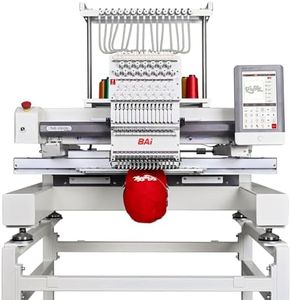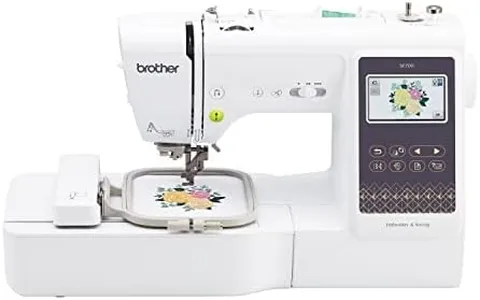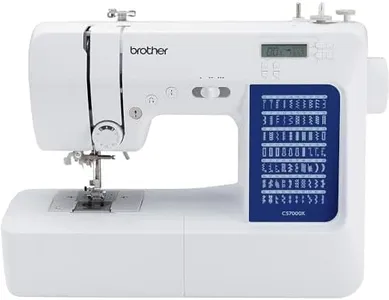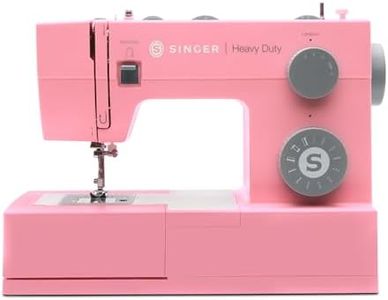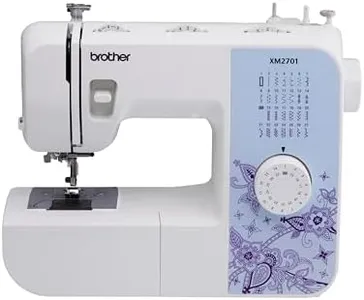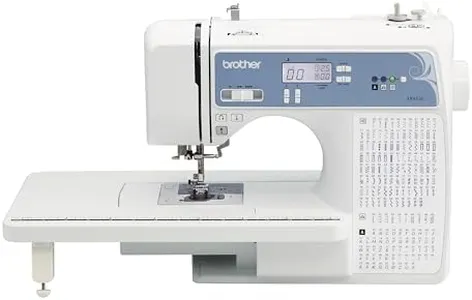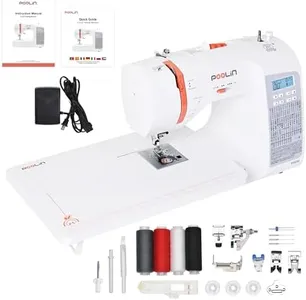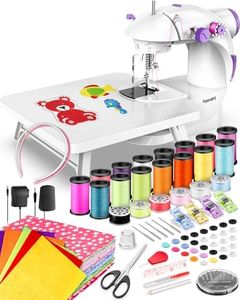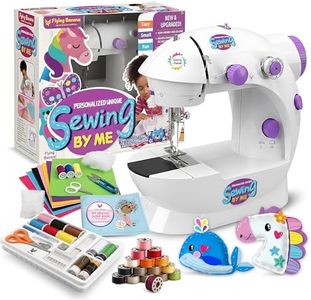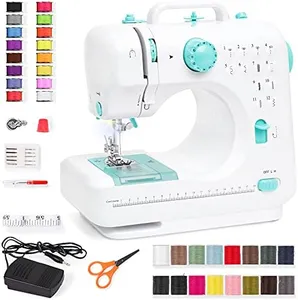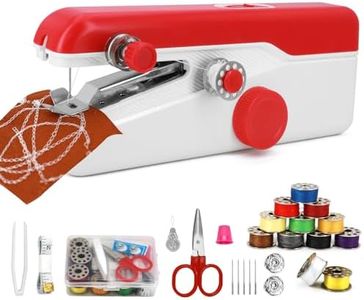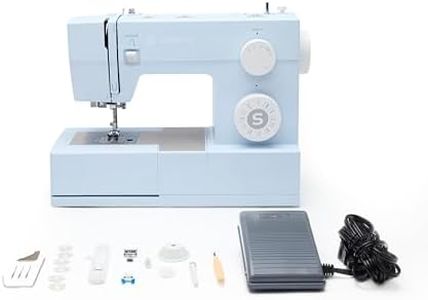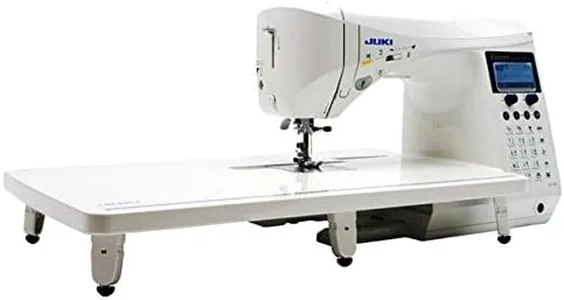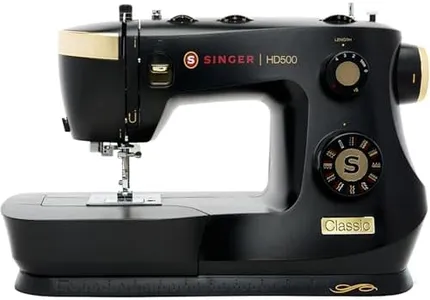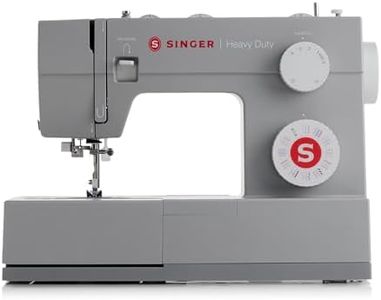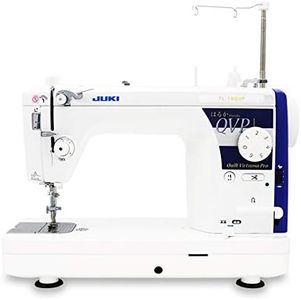10 Best Sewing Machines 2026 in the United States
Our technology thoroughly searches through the online shopping world, reviewing hundreds of sites. We then process and analyze this information, updating in real-time to bring you the latest top-rated products. This way, you always get the best and most current options available.

Our Top Picks
Winner
Brother SE700 Sewing and Embroidery Machine, Wireless LAN Connected, 135 Built-in Designs, 103 Built-in Stitches, Computerized, 4" x 4" Hoop Area, 3.7" Touchscreen Display, 8 Included Feet, White
Most important from
820 reviews
The Brother SE700 Sewing and Embroidery Machine is a versatile choice for both beginners and more experienced users looking to explore sewing and embroidery. With 135 built-in designs and 103 built-in stitches, it offers a wide array of creative possibilities, making it suitable for various projects. The machine's 4" x 4" embroidery field is practical for smaller designs, and the included touchscreen display is intuitive for easy navigation and design editing.
A standout feature is its wireless capability, allowing users to transfer embroidery files directly from a computer or mobile device via the ArtSpira app, which can be a huge plus for those who like to customize their patterns. Additionally, the automatic needle threader and jam-resistant bobbin system make sewing more convenient, especially for those who may struggle with threading needles.
The embroidery field size may be limiting for larger projects, which could be a concern for users wanting to create bigger designs. While the machine weighs around 15.6 pounds, making it somewhat portable, it may not be the lightest option for those needing to move it frequently.
Most important from
820 reviews
Brother CS7000X Computerized Sewing and Quilting Machine, 70 Built-in Stitches, LCD Display, Wide Table, 10 Included Feet, White
Most important from
3431 reviews
The Brother CS7000X Computerized Sewing and Quilting Machine offers a variety of features that are beneficial for both beginners and experienced sewers. With 70 built-in stitches, including utility, decorative, heirloom, and quilting stitch functions, it provides a wide range of options for different sewing projects. The inclusion of 7 one-step auto-size buttonholes simplifies creating buttonholes, making it more user-friendly. The improved automatic needle threader is a notable feature, making threading easier and reducing frustration.
Additionally, the drop-in top bobbin is convenient and helps keep the bobbin in place securely, which is a plus for maintaining consistent stitching. The inclusion of 10 presser feet expands the machine's versatility, allowing users to tackle various sewing techniques. The durable metal frame and fixed needle bar ensure stability and cleaner stitching, making the machine capable of handling larger projects. The larger needle-to-arm workspace is another advantage, providing ample space for quilting and other large projects.
However, weighing 14 pounds, the machine may not be the most portable option for those who need to move it frequently. The machine is also intended for use only in the US at 120 volts, which could be a limitation for international buyers. As a computerized model, it offers an LCD display for easy stitch selection and adjustments, enhancing user experience. The protective hard case and additional accessories included make it a valuable package. Potential buyers should consider whether the weight and geographic voltage limitation suit their needs. The Brother CS7000X is a solid, feature-rich sewing machine suitable for a wide range of sewing and quilting tasks.
Most important from
3431 reviews
SINGER 4411 Heavy Duty Pink Sewing Machine with Accessories | High Speed, 69 Stitch Applications, Strong Motor, Metal Frame, LED Light & 4-Step Buttonhole
Most important from
8964 reviews
The Singer 4411 Heavy Duty Pink Sewing Machine is a mechanical model designed for users who want sturdy performance and versatility. It offers a large variety of 69 stitch types, including essential and decorative stitches, which is great for both basic sewing and creative projects. The 4-step buttonhole style covers standard needs but lacks the convenience of automatic buttonholes found in some computerized models. Its standout feature is a powerful motor that’s 60% stronger than usual, allowing it to sew thick fabrics like denim and leather without struggle. It sews at a fast 1,100 stitches per minute, helping you complete projects quickly.
The machine features adjustable stitch length and width, giving you control over your stitching for different fabrics and techniques. It also includes an extra-high presser foot lifter, which is helpful for bulky layers such as quilts. The top drop-in bobbin system is user-friendly, making it easier to thread and keep track of your thread supply. However, it does not have an automatic needle threader, which means threading the needle requires manual effort, possibly a bit tricky for beginners.
The free arm capability supports sewing cuffs and sleeves, adding to its versatility. Weighing 14 pounds with a sturdy metal frame, it’s durable but somewhat heavy, so it’s less portable if you plan to carry it around often. The included accessory kit has useful presser feet and tools to get started right away. Plus, the unique pink color adds a fun touch for those who want a stylish machine. This machine suits hobbyists and intermediate sewers who need a reliable, heavy-duty mechanical machine capable of handling tough fabrics and various stitch options. Beginners willing to learn manual threading and not needing computerized features will find it a solid choice. If you want automatic buttonholes or needle threading, you might want to consider computerized alternatives.
Most important from
8964 reviews
Buying Guide for the Best Sewing Machines
Choosing the right sewing machine is all about matching your needs and skills with the features available. With so many models out there – from simple mechanical options to advanced computerized machines – it’s important to understand how the main specifications relate to what you want to sew. Start by thinking about the types of projects you’re planning, your experience level, and whether you value ease of use or versatility. By looking closely at the essential features, you can make sure the machine you pick will help rather than hold you back.FAQ
Most Popular Categories Right Now
